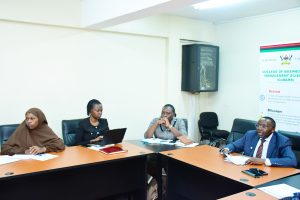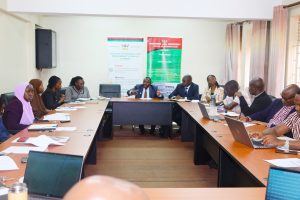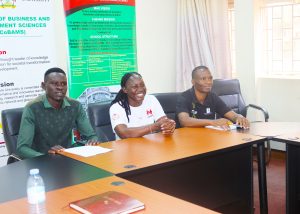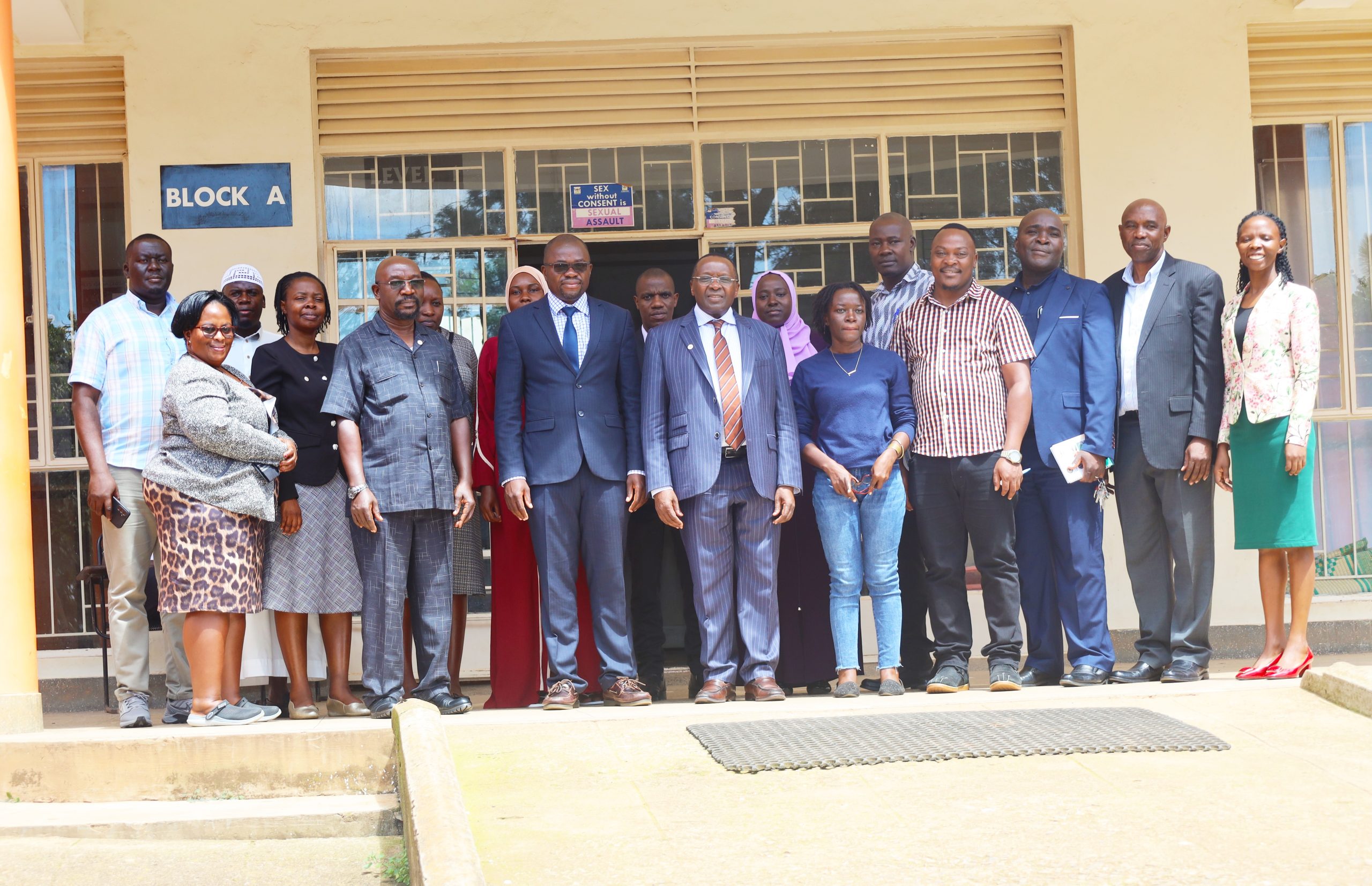On Friday 23rd May 2025, a delegation from the African Economic Research Consortium (AERC) visited Makerere University to strengthen partnership with the School of Economics through re-engineering economic research, capacity building, policy formulation and collaboration to impact Africa’s development and transformation.
The Engagement meeting focusing on shaping Africa’s future in research and development brought on board academic and administrative staff from the School of Economics under the College of Business and Management Sciences (CoBAMS) and the AERC delegation comprising: Prof. Victor Murinde-Executive Director, Dr. Charles Owino-Manager of Strategic Partnerships and Resource Mobilisation, Ms Anna Owino-Personal Assistant to the Director and Ms Veronica Nanyanzi from State House-Uganda.

Underscoring the importance of the engagement meeting, Prof. Murinde said, “Following the keen observation of the recent global economic shifts and geopolitical uncertainty, the AERC seeks strategic partnerships with African governments and institutions to chart the roadmap through research and co-production of evidence-based economic solutions.”
In line with the theme, Understanding the future of research and training collaboration with AERC, Prof. Murinde explained that the interaction also presents an opportunity to discuss the AERC Strategic Plan (2025-2035) titled, “Re-inventing the AERC for Delivering Africa’s Economic Prosperity, in which AERC is embarking on a comprehensive reform agenda, designed to strengthen research excellence, enhance policy impact and secure long-term institutional sustainability.
Concerned about the visibility and recognition of African researchers, Prof. Murinde reported that AERC will ensure that they are acknowledged with their names included in the publications. On the issue of network membership, EARC is considering the following categories: The distinguished service award, AERC Fellows, AERC Associates, and AERC Affiliates.
- Distinguished service award-Presented to those individuals who started the work in 1988
- AERC Fellows-Researchers who are active in research and capacity building
- AERC Associates-For Mid-Career researchers
- AERC Affiliates-For Masters’ and PhD students
The AERC was established in 1988, when a group of African scholars and Africanists voiced concern over the disconnect between economic research and policy formulation in Africa. According to the Executive Director, the founders of AERC observed that much of the existing economic research was either inapplicable to Africa’s economic challenges or inadequately utilized in local policymaking. Consequently, the group conceptualized a framework for fostering high-quality economic research tailored to Africa’s specific needs.
The collaboration between the AERC and Makerere University through its School of Economics started in 1988, and has led to impactful economic research in Africa, notable publications, increase in the number of faculty with PhDs at the School of Economics as well as mentorship.
Acknowledging Makerere University School of Economics as a key stakeholder in AERC, Prof. Murinde said, “Without your participation over the last 37 years, AERC would not be here.”
The Executive Director described AERC as a network of members and universities focused on providing evidence based research for policy making in Africa. Stating the key achievements, Prof. Murinde said, “A framework has been put in place to conduct research and collaboration, with AERC providing a network to work with economists across Africa. He added that the AERC has linked up the various Deans in the Member Universities in Africa both in research and the common programmes that they conduct.
Reflecting on the AERC’s journey, he noted that in 1988, the School of Economics could mention one or two members of faculty with PhDs. Over the years, with AERC’s support to research and capacity building, the School of Economics boasts of a significant number of faculty with PhDs. He highlighted that some Ugandan economists have worked with the EARC Secretariat and the EARC Board. He pointed out that the most active Ugandan economists in the AERC network are based at the following entities: Makerere University (School of Economics, College of Business and Management Sciences), Bank of Uganda, Economic Policy Research Centre (the think tank), Ministry of Finance, Planning and Economic Development, National Planning Authority, Ministry of Trade, Industry and Cooperatives, and Uganda Development Bank.
In his remarks, the Dean of the School of Economics, Associate Prof. Ibrahim Mike Okumu credited AERC for its continued collaboration, which has significantly contributed to the growth of the School. He appreciated EARC for supporting research, scholarships provided to Masters’ and PhD fellows, support for ICT infrastructure development, and contribution towards the construction of the School of Economics building.
Stressing AERC’s contribution to research at the School of Economics, Associate Prof. Okumu said, “AERC provided opportunities to ‘fresh’ fellows to write proposals. AERC would focus on building the idea. AERC has nurtured most of us into professional researchers/scholars.”
The Dean disclosed that in addition to research, some of the personalities nurtured by AERC took on academic leadership positions and have significantly contributed to the growth of the College/School. Some of the personalities include: Prof. John Ddumba-Ssentamu-former Principal and Vice Chancellor of Makerere University, Prof. Eria Hisali-former Principal of the College, Prof. Bruno Yawe-former Deputy Principal, Prof. Edward Bbaale-Principal of the College, Dr. Sarah Ssewanyana-Executive Director, Economic Research Policy Centre, and among others.
Presentation of the AERC strategic plan (2025-2035)
The remarks set the pace for the gist of the engagement meeting, which focused on presentation of the areas of transformation and the new research programmes respectively.
In the presentation, Prof. Murinde explained that AERC was reconfiguring its strategic direction in 2025-2035, to concentrate on the key strategic reform options organized around the following eight (8) core areas: Research Offerings, Graduate Training, Policy Engagement for research impact, The Consortium structure and governance, Entrenching network membership, Enhanced resource mobilization for financial sustainability, Geographical inclusion, and Possible risks to the planned reforms and how to mitigate them.
Regarding the policy engagement for research impact, Prof. Murinde noted that the ground had changed with policy makers advocating for the need to embed research into their operations. He reported that the governance structure was going to change to a more inclusive and participatory approach bringing on board stakeholders in research and capacity building.
Prof. Murinde highlighted that the new strategic plan would focus on the following research programmes:
- Security, Governance and Economic Fragility in Africa
- Industrial Policy and Growth Strategies in Africa
- Unlocking Africa’s Digital Potential for Economic Prosperity
- Africa in a Changing World: Jobs through Trade and AfCTA
- Informal Cross Border Trade (ICBT) in Africa: measurement and welfare of women, youth and their families
- Human Capital, Labour Markets and Migration
- Climate Change: Food Systems, Climate Finance, Climate Risk and Resilience
- Africa’s Trade and Investment Strategy on China
- Macroeconomic Modelling, Management and Policy Reform
Input into the AERC Strategic Plan
The participants observed that the proposed linkage between policy makers and the private sector as well as the approach of co-designing research with policy-makers, would contribute significantly to research uptake.

Discussing the new research programmes, the participants suggested that AERC integrates the following aspects: Integration of Natural resources management into economic modelling; Environmental Management; Interlinkages of Youth unemployment and the Green economy; Value Chains and Emerging threats such as fake products; Urbanisation; Youth and Substance Abuse; Health economics; the Informal Sector; and Agricultural Production.
Voices of the Graduate Students
Contributing to the discussion, the graduate students namely Proscovia Taaka, Diphus Tugume and Denis Ogwal urged AERC to continue supporting the collaborative Masters programme (CMAP) in Economics.

Way forward
Prof. Murinde thanked the participants for the valuable contributions that will definitely enrich the AERC strategic plan. He indicated that some of the proposed themes/ideas, would be considered as work streams within the different research programmes. He guided that the future is centered on PhD students at Makerere University and other member Universities formulating research questions in line with the new research programmes. AERC is working on a database of researchers in Africa to enable speed dating in research. AERC plans a twinning programme for African universities, which will enhance joint supervision for PhD students. He pointed out that on completion of the PhD, there will be an opportunity for a post-doc Fellowship. He emphasized that researchers who win “big” projects will be encouraged to have work streams. He revealed a plan for each School of Economics in Africa to access publications across the entire membership.

